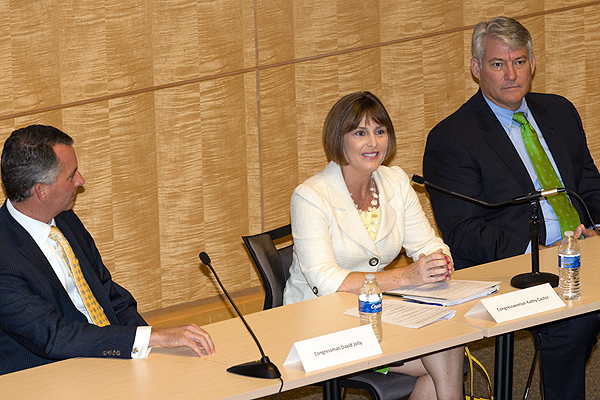Federal support of biomedical research yields a nearly 2-to-1 return on investment, economic analyses from various sources confirm. A 2012 Milken Institute report showed that every $1 in National Institutes of Health funding generates $1.70 in bioscience industry output at the state and local levels — sometimes as much as $3.20 for every dollar spent, depending on the model used.
“The internal rate of return for every dollar of NIH spending is 37 percent” said Dr. Charles Lockwood, the new senior vice president for USF Health and dean of the Morsani College of Medicine. “I would invest all my money if I could achieve that kind of return.”

USF Health Senior Vice President Dr. Charles Lockwood commented on the economic benefits of federal research funding at the Biomedical Research Roundtable hosted by Moffitt Cancer Center and USF.
Dr. Lockwood’s point was one emphasized by several participants at the May 12 Biomedical Research Roundtable convened by the University of South Florida and Moffitt Cancer Center to highlight the importance of biomedical research to the Tampa Bay area. The long-term benefits of robust federal research funding – sparking innovations that lead to longer lives, improved health and reduced disease and disability as well as spurring job creation and local economic growth — far outweigh its costs.
Dr. Lockwood spoke from the audience during the question-and-answer portion of the program, which featured panelists Dr. Alan List, Moffitt CEO; Dr. Thomas Sellers, center director at Moffitt; USF President Judy Genshaft; Dr. Paul Sanberg, senior vice president for research and innovation at USF; and three representatives from Florida’s Congressional delegation, U.S. Rep. Kathy Castor, U.S Rep. David Jolly and U.S. Rep. Dennis Ross.
Moderator John Schueler, chief operating officer of the Tampa Bay Partnership, called USF and Moffitt the anchors of biomedical research and development activities across the Tampa Bay region – fueling the discoveries and public-private partnerships that lead to intellectual property and new companies.

L to R: Dr. Thomas Sellers, center director at Moffitt; Dr. Paul Sanberg, USF senior vice president for research and innovation; and USF President Judy Genshaft, were among the panelists at the roundtable discussion.
The clinicians, scientists, postdoctoral fellows, fellows and others attending expressed concern that the progress made by USF and Moffitt to help benefit patients with cancer and other diseases could be slowed if fiscal strains on NIH funding continue.
Federal funding for biomedical research has remained flat for more than a decade, outpaced by inflation, even as the need for upgrades in laboratory infrastructure and demands for a highly-trained scientific workforce grow. Grant applications have doubled yet fewer grants are funded, affecting both the number and dollar amounts of awards.
Dr. Lockwood pointed out that this downward trajectory disproportionately affects public research universities like USF, which last year received 61 percent of its $151 million in federally-funded grants from the NIH.
He suggested some ways to build upon the health and economic benefits driven by federally-supported biomedical advances and clinical breakthroughs and to remain competitive in a global research environment:
– Tie federal research funding to the gross domestic product at a level comparable to investments by China, which is scaling up its research and development spending at a rate of growth projected to surpass the United States in the next few years.
– Reassess the methods for determining the administrative overhead or “indirect” costs that are paid to universities by federal agencies as part of administering a grant.
– Streamline regulations and critically evaluate and eliminate NIH extramural programs not proven to be cost-effective.
In addition to Dr. Lockwood, Dr. David Morgan, CEO of the USF Health Byrd Alzheimer’s Institute, and Dr. Aimee Klein, associate professor and coordinator of post-professional residency education at the USF School of Physical Therapy & Rehabilitation Sciences, were among the faculty members participating in the roundtable discussion.

L to R: Florida Congressional representatives, David Jolly, Kathy Castor and Dennis Ross. The lawmakers listened to concerns by scientists, clinicians, and business and economic development leaders about the effects of declining federal funding on the pace of research and development. Listen to the WUSF University Beat recap of the roundtable on the impact of biomedical research and how to continue that momentum. Photos of panelists courtesy of Moffitt Cancer Center
